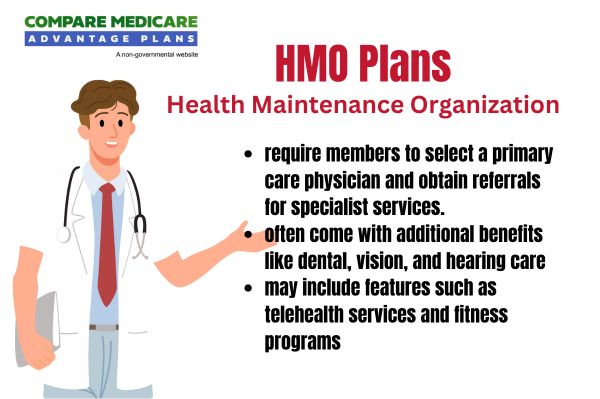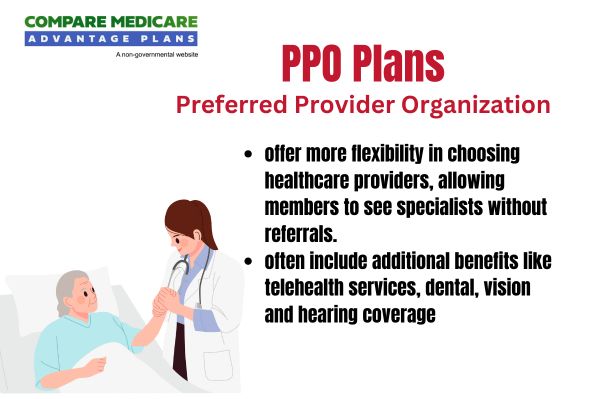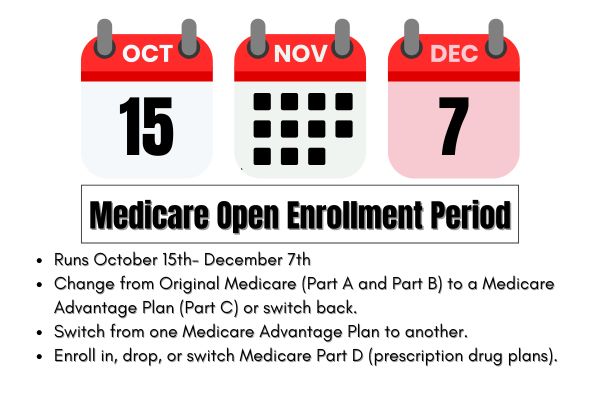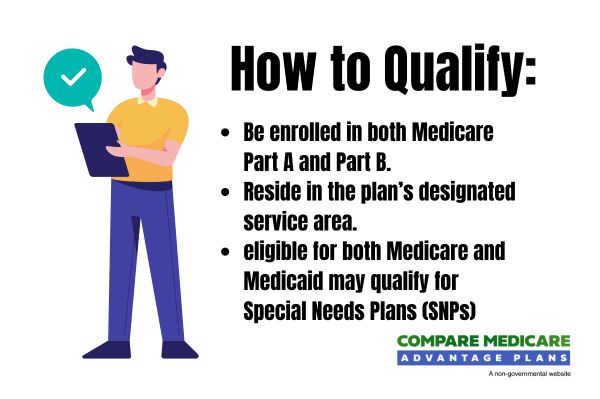




Medicare Advantage Plans Delaware 2026
Want to know more about the potential Medicare Advantage Plans in Delaware for 2026? This article covers the available plan options, potential benefits, costs, and enrollment information to help you make an informed decision.
Key Takeaways
- Some Delaware Medicare Advantage plans combine Medicare Parts A and B with additional benefits like dental, hearing, and vision coverage.
- The main types of plans available include HMO, PPO, and Special Needs Plans, each catering to different healthcare needs and preferences.
- Enrollment in Medicare Advantage plans occurs during designated periods, with options for changes during annual open enrollment and special enrollment periods.
Compare Plans in One Step!
Enter Zip Code
Understanding Delaware Medicare Advantage Plans

Medicare Advantage plans in Delaware combine Medicare Parts A and B into a single plan, sometimes providing additional benefits such as dental and vision coverage. These plans are offered by private insurance companies and are approved by the Centers for Medicare and Medicaid Services (CMS). Delaware residents will likely have a variety of options to choose from.
Evaluating the structure and potential benefits of these plans could help in making an informed healthcare coverage decision.
Types of Delaware Medicare Advantage Plans Available
Delaware will likely offer a variety of Medicare Advantage plans designed to meet different healthcare needs and preferences. These plans combine coverage for hospital care, outpatient services, and sometimes additional benefits like dental, hearing, and vision care.
The main types of Medicare Advantage plans available in Delaware include Health Maintenance Organization (HMO) plans, Preferred Provider Organization (PPO) plans, and Special Needs Plans (SNPs). Each type has its unique features and advantages, catering to different preferences and healthcare requirements.
HMO Plans

Health Maintenance Organization (HMO) plans in Delaware typically require members to use a specific network of doctors and specialists. These plans may have lower premiums but might necessitate referrals from a primary care physician to see specialists. Members must choose a primary care physician who coordinates their healthcare needs.
While HMO plans generally require members to stay within their network for full coverage, some plans could offer more flexibility. For instance, Point of Service (HMO-POS) plans permit members to seek care outside the network at a higher cost. However, this may also result in increased out-of-pocket expenses.
PPO Plans

Preferred Provider Organization (PPO) plans offer more flexibility in choosing healthcare providers compared to HMO plans. Members can access both in-network and out-of-network providers, though at a higher cost for the latter. One of the potential advantages of PPO plans is that they do not require referrals to see specialists.
Delaware will likely offer both local and regional PPO plans, with the latter covering a broader geographic area. This flexibility could make PPO plans attractive for those seeking more freedom in choosing healthcare providers while retaining the benefits of a Medicare Advantage plan.
Special Needs Plans (SNPs)

Special Needs Plans (SNPs) are designed for individuals with specific conditions or needs, offering specialized services and support. These plans cater to specific populations, such as those with chronic illnesses or institutionalized individuals, providing tailored benefits.
There are three types of SNPs: Chronic Condition SNPs, Dual Eligible SNPs, and Institutional SNPs, each addressing unique healthcare requirements. In Delaware, SNPs may offer care management services and specialized medical equipment to support members’ health needs.
Only individuals who meet specific criteria can enroll in SNPs, ensuring targeted benefits.
Overview of Delaware Medicare Advantage Plans
Delaware Medicare Advantage plans, also known as Part C, combine coverage from Medicare Parts A and B, possilby offering an alternative to Original Medicare. Some plans may also include additional benefits such as vision, dental, and hearing services, which are not typically covered by Original Medicare. Eligibility for these plans requires beneficiaries to be enrolled in Medicare Parts A and B.
Potential Services and Benefits

In Delaware, Medicare Advantage plans commonly bundle coverage for hospital services, outpatient visits, and sometimes includes additional benefits like vision and dental care. Certain plans may also offer coverage for prescription drugs. This comprehensive coverage likely ensures that enrollees have access to a wide range of medical services under one plan.
Possible Benefits of Delaware Medicare Advantage Plans
Some Delaware Medicare Advantage plans may offer additional benefits that could go beyond standard Medicare, such as vision, hearing, and dental coverage. This approach could help in maintaining good health but also in early detection and treatment of potential health issues.
Plan members may also have lower out-of-pocket costs for healthcare services compared to Original Medicare. Some plans may also cover prescription drugs, possibly integrating coverage for multiple healthcare needs.
Enrollment Process for Delaware Medicare Advantage Plans
Individuals eligible for Medicare should enroll in Parts A and B up to three months before their retirement date. Enrollment in Medicare Advantage plans occurs during designated enrollment periods, which include initial eligibility and annual open enrollment.
Knowing when and how to enroll is crucial for securing appropriate coverage.
When to Enroll
Enrollment for Medicare Parts A and B can begin as early as three months prior to the expected retirement date. Eligible individuals may begin enrollment in Medicare Advantage plans when they first qualify for Medicare benefits.

Delaware Medicare Advantage plans have an annual open enrollment period from October 15 to December 7, and another from January 1 to March 31 for making changes to existing plans. These periods offer enrollees multiple opportunities to evaluate and adjust their coverage.
Different Enrollment Periods
There are specific enrollment periods defined for Medicare, including initial enrollment and annual periods. The annual open enrollment period for Medicare Advantage plans occurs from October 15 to December 7 each year. Individuals can enroll in Medicare Advantage plans during their initial eligibility period, which begins three months before they turn 65 and ends three months after they turn 65.
The Medicare Advantage open enrollment period from January 1 to March 31 allows plan changes or a return to Original Medicare. Special Enrollment Periods (SEPs) are available for significant life changes like moving or losing coverage, ensuring beneficiaries can adjust their plans as needed.
OEP, AEP, Special Enrollment
The Open Enrollment Period (OEP) and Annual Enrollment Period (AEP) allow beneficiaries to make changes to their Medicare plans. The Medicare Advantage Open Enrollment Period allows individuals already enrolled in a Medicare Advantage plan to switch plans or revert to Original Medicare from January 1 to March 31.
Special Enrollment Periods (SEPs) allow beneficiaries to enroll or modify coverage in response to life events like relocation or health status changes, ensuring coverage flexibility year-round.
Costs Associated with Delaware Medicare Advantage Plans
Some Delaware Medicare Advantage plans may offer monthly premium that might vary by plan. Knowing the possible costs associated with these plans could be vital for making informed decisions.
Premiums and Co-Pays
Some Medicare Advantage plans in Delaware might require members to pay a monthly premium in addition to their Medicare Part B premium. Co-pays for services under certain plans could vary significantly depending on the plan and the type of service received, so beneficiaries should evaluate their expected healthcare usage to understand potential costs.
Certain plans may also impose additional costs for out-of-network services, affecting total out-of-pocket expenses. These variations likely underscore the importance of a review of each plan’s details to find one that suits your healthcare needs and financial situation.
Out-of-Pocket Maximums
Delaware Medicare Advantage plans might offer an out-of-pocket maximum that could potentially limit member spending on covered services in a calendar year. This cap could offer financial protection by ensuring that members do not pay more than a set amount for covered services annually. This cap could be crucial for managing healthcare expenses and avoiding unexpected financial burdens.
Covered Services and Possible Benefits
Delaware Medicare Advantage plans typically include hospital and outpatient services, sometimes incorporating additional benefits not found in Original Medicare. Some plans may provide coverage for prescription drugs, dental, vision, and hearing services. These comprehensive benefits could provide enrollees access to a wide range of medical services under one plan.
How to Qualify for Delaware Medicare Advantage Plans
Individuals eligible for Delaware Medicare Advantage plans must be enrolled in Medicare Part A and Part B. To qualify, applicants should reside in the service area of the Medicare Advantage plan they wish to enroll in. Certain plans may have additional eligibility criteria based on specific health conditions or disabilities.

Individuals under 65 who qualify for Medicare due to a disability can also enroll in Medicare Advantage plans. Enrollment typically occurs during specific periods, including initial enrollment and annual open enrollment.
Knowing these eligibility requirements helps ensure access to the necessary benefits and coverage.
Contracted Network and Access to Care
HMO plans typically require members to use a specific network of local doctors and hospitals for covered services, except in emergencies. This network requirement helps manage costs and ensure coordinated care but might limit access to certain providers. PPO plans provide more flexibility by allowing members to seek care outside the contracted network, albeit often at a higher cost.
Certain HMO plans may not mandate referrals for specialist services, simplifying access to care. Knowing the network and access requirements of different plans could help ensure you can receive necessary care without complications or added costs.
Comparing Delaware Medicare Advantage Plans to Original Medicare
Some Medicare Advantage plans in Delaware might include additional benefits beyond Original Medicare, such as dental, hearing, and vision care. These plans could offer a bundled approach, possibly providing more comprehensive care options and financial protections.
Coverage Differences
Original Medicare primarily covers hospital and outpatient services, while certain Medicare Advantage plans may bundle these with extra services like dental, vision, and hearing care. Medicare Advantage plans typically bundle Part A, Part B, and sometimes Part D, whereas Original Medicare does not include additional benefits. One potential difference might be that Original Medicare has no out-of-pocket maximum, whereas some Medicare Advantage plans may feature a cap on out-of-pocket expenses, possibly offering more financial protection.
Medicare Advantage plans may require referrals for specialists, unlike Original Medicare. Additionally, their provider networks might be more restrictive compared to the broader access allowed by Original Medicare.
Cost Comparisons
Beneficiaries should consider both the potential premiums and out-of-pocket costs when comparing Medicare Advantage with Original Medicare to determine the most economical option.
Plan availability and cost might vary by location within Delaware, with different health insurance companies offering various plans. Some plans may include additional benefits like vision and dental care, which could be more cost-effective than Original Medicare.
Emergencies and Referrals

In an HMO plan, members typically need to use a specific network of providers for their care, but emergency services are covered even if they are received outside this network. PPO plans offer more flexibility than HMO plans, allowing members to seek care from both in-network and out-of-network providers without a referral. Some HMO plans may not require a referral for access to specialty care, easing the process for members needing specialized services. Emergency services do not typically require prior authorization under Delaware Medicare, allowing for immediate care when needed.
Summary
Delaware Medicare Advantage plans will likely offer a comprehensive and flexible approach to healthcare coverage, sometimes combining Medicare Parts A and B with additional benefits. These plans will likelycater to various healthcare needs and preferences, offering options like HMO, PPO, and SNPs. Understanding the possible costs, coverage, and enrollment periods is crucial for making informed decisions.
By exploring the different types of plans, their potential benefits, and the enrollment process, you can choose the best Medicare Advantage plan that fits your needs. As you navigate these options, remember that the right plan can provide peace of mind and better health management. Take action today to secure the coverage that best supports your health and well-being.
Frequently Asked Questions
→ When can I enroll in a Delaware Medicare Advantage plan?
You can enroll in a Delaware Medicare Advantage plan during your initial eligibility period, the Annual Enrollment Period from October 15 to December 7, and the Medicare Advantage Open Enrollment Period from January 1 to March 31. Make sure to take advantage of these windows to secure your coverage.
→ What additional benefits could Medicare Advantage plans offer compared to Original Medicare?
Some Medicare Advantage plans may provide additional benefits that could go beyond Original Medicare, including dental, vision, and hearing care. These potential benefits could make these plans a more comprehensive option for many individuals seeking enhanced healthcare coverage.
→ What costs may be associated with Medicare Advantage plans?
Medicare Advantage plans might involve monthly premiums, co-pays, and out-of-pocket maximums.
→ Can I switch my Medicare Advantage plan if my needs change?
Yes, you can switch your Medicare Advantage plan during the Open Enrollment Period from January 1 to March 31, or during a Special Enrollment Period if you experience significant life changes.

ZRN Health & Financial Services, LLC, a Texas limited liability company




